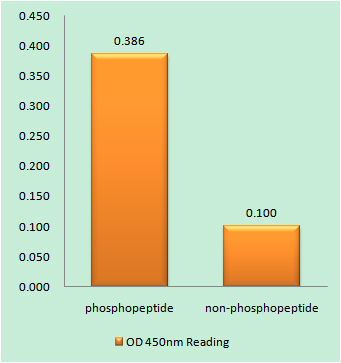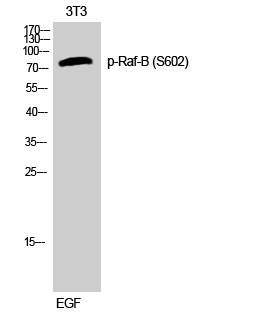Total Raf-B Cell-Based Colorimetric ELISA Kit
- Catalog No.:KA3050C
- Applications:ELISA
- Reactivity:Human;Mouse
- Gene Name:
- BRAF
- Human Gene Id:
- 673
- Human Swiss Prot No:
- P15056
- Mouse Swiss Prot No:
- P28028
- Storage Stability:
- 2-8°C/6 months
- Other Name:
- Serine/threonine-protein kinase B-raf (EC 2.7.11.1) (Proto-oncogene B-Raf) (p94) (v-Raf murine sarcoma viral oncogene homolog B1)
- Detection Method:
- Colorimetric
- Background:
- catalytic activity:ATP + a protein = ADP + a phosphoprotein.,cofactor:Binds 2 zinc ions per subunit.,disease:Defects in BRAF are a cause of cardiofaciocutaneous syndrome (CFC syndrome) [MIM:115150]; also known as cardio-facio-cutaneous syndrome. CFC syndrome is characterized by a distinctive facial appearance, heart defects and mental retardation. Heart defects include pulmonic stenosis, atrial septal defects and hypertrophic cardiomyopathy. Some affected individuals present with ectodermal abnormalities such as sparse, friable hair, hyperkeratotic skin lesions and a generalized ichthyosis-like condition. Typical facial features are similar to Noonan syndrome. They include high forehead with bitemporal constriction, hypoplastic supraorbital ridges, downslanting palpebral fissures, a depressed nasal bridge, and posteriorly angulated ears with prominent helices. The inheritance of CFC syndrome is autosomal dominant.,disease:Defects in BRAF are involved in a wide range of cancers.,disease:Defects in BRAF are involved in lung cancer [MIM:211980].,disease:Defects in BRAF are involved in non-Hodgkin lymphoma (NHL) [MIM:605027]. NHL is a cancer that starts in cells of the lymph system, which is part of the body's immune system. NHLs can occur at any age and are often marked by enlarged lymph nodes, fever and weight loss.,disease:Defects in BRAF may be a cause of colorectal cancer (CRC) [MIM:114500].,function:Involved in the transduction of mitogenic signals from the cell membrane to the nucleus. May play a role in the postsynaptic responses of hippocampal neuron.,similarity:Belongs to the protein kinase superfamily. TKL Ser/Thr protein kinase family. RAF subfamily.,similarity:Contains 1 phorbol-ester/DAG-type zinc finger.,similarity:Contains 1 protein kinase domain.,similarity:Contains 1 RBD (Ras-binding) domain.,subunit:Interacts with RIT1.,tissue specificity:Brain and testis.,
- Function:
- MAPKKK cascade, protein complex assembly, protein amino acid phosphorylation, phosphorus metabolic process,phosphate metabolic process, anti-apoptosis, intracellular signaling cascade, protein kinase cascade, small GTPase mediated signal transduction, regulation of cell death, phosphorylation, regulation of apoptosis, negative regulation of apoptosis, regulation of programmed cell death, negative regulation of programmed cell death, macromolecular complex subunit organization, protein oligomerization, protein heterooligomerization, negative regulation of cell death, macromolecular complex assembly, protein complex biogenesis,
- Subcellular Location:
- Nucleus . Cytoplasm . Cell membrane . Colocalizes with RGS14 and RAF1 in both the cytoplasm and membranes. .
- Expression:
- Brain and testis.
- June 19-2018
- WESTERN IMMUNOBLOTTING PROTOCOL
- June 19-2018
- IMMUNOHISTOCHEMISTRY-PARAFFIN PROTOCOL
- June 19-2018
- IMMUNOFLUORESCENCE PROTOCOL
- September 08-2020
- FLOW-CYTOMEYRT-PROTOCOL
- May 20-2022
- Cell-Based ELISA│解您多样本WB检测之困扰
- July 13-2018
- CELL-BASED-ELISA-PROTOCOL-FOR-ACETYL-PROTEIN
- July 13-2018
- CELL-BASED-ELISA-PROTOCOL-FOR-PHOSPHO-PROTEIN
- July 13-2018
- Antibody-FAQs


